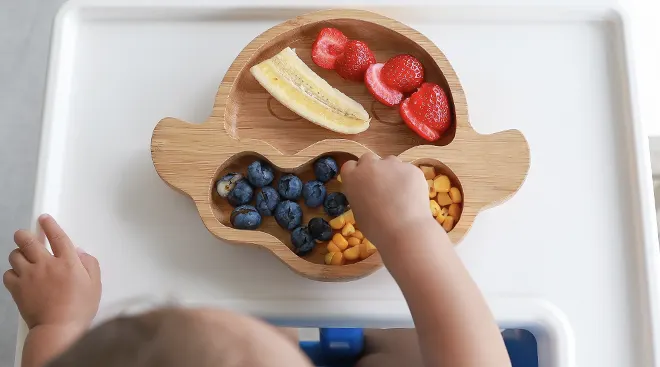Selecting the right snacks for babies is crucial for ensuring proper nutrition and supporting healthy growth. With various options available, parents must navigate nutritional labels, ingredient lists, and developmental appropriateness to choose the best bites for their little ones.
This comprehensive guide aims to give valuable insights into choosing nutritious, safe, and age-appropriate baby snacks. Additionally, considering the texture and size of food can help prevent choking hazards and ensure ease of consumption for infants and toddlers.
Understanding Baby Nutrition
Nutritional Requirements
Babies’ unique nutritional needs differ significantly from those of older children and adults. During their first year, babies require a diet of important nutrients like iron, calcium, vitamins, and healthy fats to support rapid growth and development. Food should complement their main meals by providing additional nutrients and energy.
Importance of Natural Ingredients
Choosing snacks with natural ingredients ensures that babies receive wholesome nutrition without unnecessary additives. Food made from organic fruits, vegetables, and whole grains is preferable as it is less likely to contain harmful pesticides, artificial flavours, or preservatives.
Age-Appropriate Snacks
6 to 8 Months
Babies typically start on solid foods and explore new tastes and textures at this stage. Suitable bites for this age group include soft, easily digestible options like pureed fruits and vegetables, rice rusks, and teething wafers. These bites should be free from added sugars and salt to avoid overwhelming the baby’s developing palate.
8 to 10 Months
As babies become more adept at chewing, foods can gradually introduce texture and variety. Options such as soft fruit slices, steamed vegetable sticks, and small pieces of cheese are excellent choices. These help babies develop their chewing skills and hand-eye coordination while providing essential nutrients.
10 to 12 Months
By this age, babies will likely eat a broader range of foods and can handle more complex textures. Snacks like whole grain crackers, small sandwiches, and bite-sized pieces of soft meat or poultry can be introduced. These should still be easy to chew and swallow to prevent choking hazards.
Critical Factors in Choosing Snacks for Babies
Safety and Choking Hazards
Safety is paramount when selecting baby food. Choosing foodstuffs appropriate for the baby’s developmental stage is crucial to lower the risk of choking. For younger babies, food should be soft or easily dissolvable, and for older babies, it should be bite-sized or manageable. Always supervise snack times to ensure safety.
Nutritional Content
Evaluating snacks’ nutritional content is critical. Opt for foods rich in necessary nutrients and low in added sugars and unhealthy fats. Reading labels to check for vitamins, minerals, and other beneficial ingredients can help make informed decisions. Snacks with a steady mix of carbohydrates, proteins, and fats support growth and development.
Allergens
Many common allergens, such as nuts, dairy, and gluten, can be present in baby food. Potential allergens should be introduced gradually and one at a time, monitored for adverse reactions, and consulted with a paediatrician before introducing new allergens, especially if there is a family history of allergies.
Types of Baby Snacks
Fruits and Vegetables
Fruits and vegetables are fantastic options as they are naturally nutritious and often well-received by babies. Pureed or mashed fruits like bananas, apples, pears and steamed vegetables like carrots and sweet potatoes provide essential vitamins and minerals.
Whole Grains
Whole grain offers fibre and sustained energy. Options like oatmeal, whole grain cereals, and rice cakes suit older babies. Ensure that these are low in added sugars and salt. Entire grain foods benefit toddlers by providing important nutrients like B vitamins, magnesium, and iron, which are crucial for their growth and development. Choosing whole-grain options helps maintain a balanced diet and supports healthy digestion.
Protein-Rich Snacks
Introducing protein-rich foods helps support muscle development and overall growth. Soft-cooked eggs, small pieces of chicken or turkey, and mashed beans are excellent protein sources. Ensure these are cooked thoroughly and cut into manageable sizes. Protein is also critical for repairing body tissues and maintaining a healthy immune system. Including various protein sources like lean meats, legumes, and dairy ensures a balanced intake of amino acids necessary for a toddler’s development.
Selecting the best baby snacks involves considering nutrition, taste, and safety. Opt for snacks with natural ingredients, low sugar, and essential nutrients. Check for potential allergens and avoid artificial additives. Prioritise foods that support developmental milestones, such as teething biscuits or soft fruits. Always read labels and consult with paediatricians if unsure. Offering various healthy options can help develop good eating habits early on. Ensuring these are age-appropriate and easy to consume will provide nutrition and enjoyment for your baby, fostering a positive relationship with food


